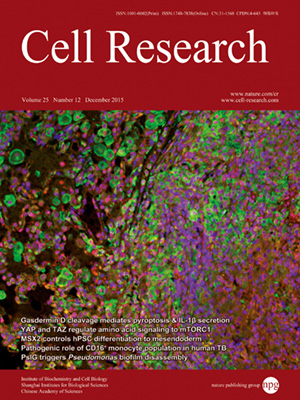Volume 25 Issue 12, December 2015: 1333-1351
ORIGINAL ARTICLES
Tuberculosis is associated with expansion of a motile, permissive and immunomodulatory CD16+ monocyte population via the IL-10/STAT3 axis
Claire Lastrucci1,2, Alan Bénard1,2,*, Luciana Balboa3,*, Karine Pingris1,2, Shanti Souriant1,2, Renaud Poincloux1,2, Talal Al Saati4, Voahangy Rasolofo5, Pablo González-Montaner6, Sandra Inwentarz6, Eduardo Jose Moraña6, Ivanela Kondova7, Frank AW Verreck7, Maria del Carmen Sasiain3, Olivier Neyrolles1,2, Isabelle Maridonneau-Parini1,2, Geanncarlo Lugo-Villarino1,2,# and Céline Cougoule1,2,#
1CNRS, Institut de Pharmacologie et de Biologie Structurale (IPBS), Département of Tuberculosis and Infection Biology, Toulouse, France
2Université de Toulouse; Université Paul Sabatier, UPS, IPBS, Toulouse, France
3Inmunologia de Enfermedades Respiratorias, Instituto de Medicina Experimental (IMEX)-CONICET, Academia Nacional de Medicina, Pacheco de Melo 3081, 1425, Buenos Aires, Argentina
4INSERM/UPS-US006/CREFRE, Service d'Histopathologie, CHU Purpan, 31024, Toulouse, France
5Mycobacteria Unit, Pasteur Institute in Antananarivo, Antananarivo, Madagascar
6Instituto Prof. Dr. Raúl Vaccarezza, Hospital de Infecciosas Dr. F.J. Muñiz, Buenos Aires, Argentina
7Department of Parasitology, Biomedical Primate Research Centre, Rijswijk, the Netherlands
Correspondence: Isabelle Maridonneau-Parini, Tel: +33-0-5 61 17 54 58; Fax: + 33-0-5 61 17 59 94 E-mail: Isabelle.Maridonneau-Parini@ipbs.fr; Olivier Neyrolles,(Olivier.Neyrolles@ipbs.fr)
The human CD14
+ monocyte compartment is composed by two subsets based on CD16 expression. We previously reported that this compartment is perturbed in tuberculosis (TB) patients, as reflected by the expansion of CD16
+ monocytes along with disease severity. Whether this unbalance is beneficial or detrimental to host defense remains to be elucidated. Here in the context of active TB, we demonstrate that human monocytes are predisposed to differentiate towards an anti-inflammatory (M2-like) macrophage activation program characterized by the CD16
+CD163
+MerTK
+pSTAT3
+ phenotype and functional properties such as enhanced protease-dependent motility, pathogen permissivity and immunomodulation. This process is dependent on STAT3 activation, and loss-of-function experiments point towards a detrimental role in host defense against TB. Importantly, we provide a critical correlation between the abundance of the CD16
++CD163
+MerTK
+pSTAT3
+ cells and the progression of the disease either at the local level in a non-human primate tuberculous granuloma context, or at the systemic level through the detection of the soluble form of CD163 in human sera. Collectively, this study argues for the pathogenic role of the CD16
+CD163
+MerTK
+pSTAT3
+ monocyte-to-macrophage differentiation program and its potential as a target for TB therapy, and promotes the detection of circulating CD163 as a potential biomarker for disease progression and monitoring of treatment efficacy.
10.1038/cr.2015.123
FULL TEXT | PDF
Browse 2484


